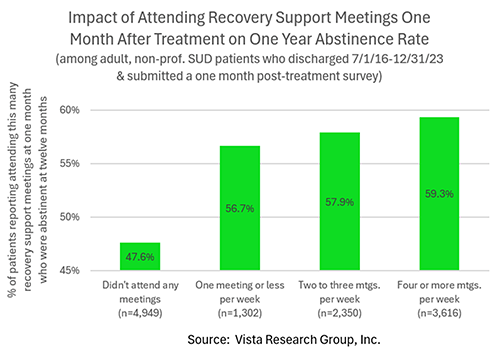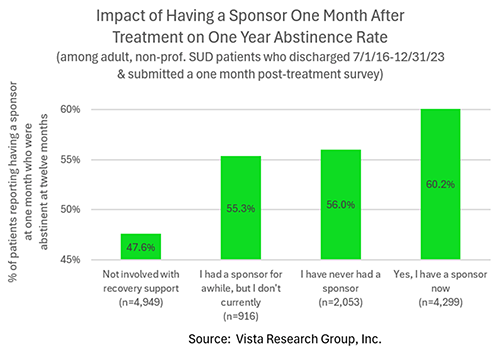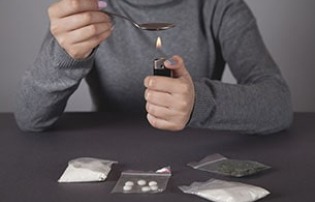After three residential rehabs, multiple IOPs and long periods in sober living, my daughter finally became so scared about what alcoholism was doing to her body that she committed to never drinking again. As she told me later:
“Previously, when I’d attended AA, I’d taken the program piecemeal; I was willing to go to meetings, but I wasn’t willing to get a sponsor. Or, I’d get a sponsor, but I wouldn’t go through the rest of the steps. This time, I had nothing left to lose but my life, and I became willing to go through the program exactly as prescribed in the Big Book of Alcoholics Anonymous. I honestly didn’t believe it would work for me - but after several months, I suddenly realized that I had gone several days without an intense craving to drink, and at that point in my life that was a miracle."
Thirteen years later, I am immensely grateful to report that Karina is still sober.
Vista’s research confirms the tremendous impact recovery support groups can have on an individual’s ability to stay sober. Among the patients who were reachable one year after leaving treatment, those who were not using alcohol or illicit drugs were far more likely to be attending AA, NA or other recovery support group meetings than those who were using:

Most (55%) of the individuals who were abstinent and attending recovery support group meetings one year after leaving treatment reported having done so continually since they left treatment.
In fact, one of the best predictors of a person’s likelihood to be abstaining from alcohol and illicit drugs one year after treatment is whether they are attending recovery support meetings one month after discharge. Among those who are reachable one month after treatment and attending four or more meetings per week, almost 60% will be abstinent eleven months later:

It is incredible that involvement in an almost-free, volunteer-run community can have such an impact!
Of course, it is difficult for a parent or other loved one to know whether an individual is actively engaging with others in the recovery support community or simply going through the motions. If I was helping a family member recover today, I would use whether they have an AA or NA sponsor one month after treatment as an indicator of their seriousness. Our research shows that sixty percent (60%) of people who have a sponsor one month after discharge will be abstinent eleven months later:

Personally, I would be quite worried if someone told me they had had a sponsor, but had lost their support in less than one month. Yes, it’s possible that the sponsor themselves relapsed or had a major life change. However, being a good sponsor takes a lot of time and energy, and it’s more likely that the sponsor decided your loved one wasn’t serious enough about staying sober to warrant the commitment.
Not all recovery support communities recommend sponsors. For those that do, the fact that your loved one has asked someone to help them stay sober is clearly an important predictor of long-term success.






